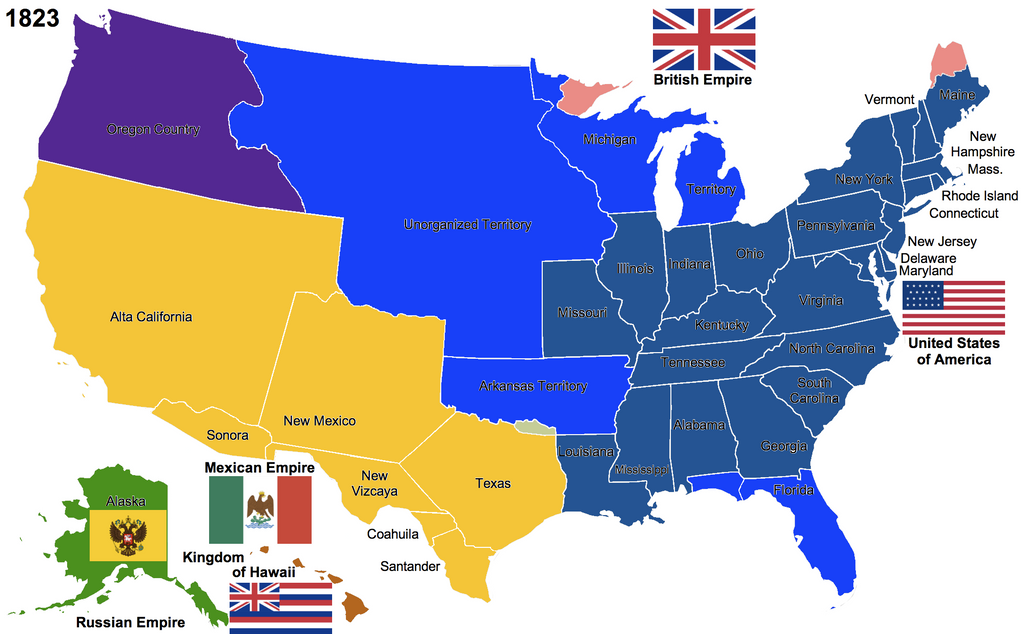raharris1973
Well-known member
WI select Union and Confederate states and forces ISOT from Jan 1863 to Jan 1823?
The limitation is that only those states (and people and forces on the land of those states) that were admitted parts of the Union in 1823 are ISOT back in time, whereas any state that was still in a territorial phase (like Florida or Minnesota or Arkansas), or still foreign territory (like Texas and California and Oregon) is not ISOT back and its downtime 1823 version remains in place. Likewise, any forces in position in non-ISOT-ed states or territory 'miss the ride' back in time.
That leaves the line up CSA states as follows: Virginia, North Carolina, South Carolina, Georgia, Tennessee, Alabama, Mississippi, Louisiana (Florida, Arkansas, Texas, and any controlled parts of Indian territory and Arizona/New Mexico territory are missing).
That leaves the Union as follows: Maine, New Hampshire, Vermont, Massachusetts, Rhode Island, Connecticut, New York, New Jersey, Delaware, Maryland, Pennsylvania, occupied Virginia, Ohio, Indiana, Illinois, Missouri, Kentucky (Michigan, Wisconsin, Minnesota, Iowa, Kansas, California, Oregon, Nevada, all territories are missing).
How does the war proceed from there, with various missing states/territories and military units, and the surrounding world being switched to that of 1823?
How does the aftermath of the war go, including the re-settlement of downtime territories. Does the USA (or CSA, if it somehow survives) re-expand to the west coast by claiming its share of Oregon, re-annexing Texas, and going to war with Mexico again for California?
-------a 2nd variant on this scenario -
WI select Union and Confederate states and forces ISOT from Jan 1863 to Jan 1785?
The limitation is that only those states (and people and forces on the land of those states) that were admitted parts of the Union in 1785 are ISOT back in time, whereas any state that was still in a territorial phase (like Florida or Minnesota or Arkansas), or still foreign territory (like Texas and California and Oregon) is not ISOT back and its downtime 1885 version remains in place. Likewise, any forces in position in non-ISOT-ed states or territory 'miss the ride' back in time.
That leaves the line up CSA states as follows: Virginia, North Carolina, South Carolina, Georgia
That leaves the Union as follows: New Hampshire, Vermont, Massachusetts, Rhode Island, Connecticut, New York, New Jersey, Delaware, Maryland, Pennsylvania, occupied Virginia.
How does the war proceed from there, with various missing states/territories and military units, and the surrounding world being switched to that of 1823?
How does the aftermath of the war go, including the re-settlement of downtime territories. Does the USA (or CSA, if it somehow survives) re-expand to the west coast by claiming Louisiana, and later its share of Oregon, re-annexing Texas, and going to war with Mexico again for California?
The limitation is that only those states (and people and forces on the land of those states) that were admitted parts of the Union in 1823 are ISOT back in time, whereas any state that was still in a territorial phase (like Florida or Minnesota or Arkansas), or still foreign territory (like Texas and California and Oregon) is not ISOT back and its downtime 1823 version remains in place. Likewise, any forces in position in non-ISOT-ed states or territory 'miss the ride' back in time.
That leaves the line up CSA states as follows: Virginia, North Carolina, South Carolina, Georgia, Tennessee, Alabama, Mississippi, Louisiana (Florida, Arkansas, Texas, and any controlled parts of Indian territory and Arizona/New Mexico territory are missing).
That leaves the Union as follows: Maine, New Hampshire, Vermont, Massachusetts, Rhode Island, Connecticut, New York, New Jersey, Delaware, Maryland, Pennsylvania, occupied Virginia, Ohio, Indiana, Illinois, Missouri, Kentucky (Michigan, Wisconsin, Minnesota, Iowa, Kansas, California, Oregon, Nevada, all territories are missing).
How does the war proceed from there, with various missing states/territories and military units, and the surrounding world being switched to that of 1823?
How does the aftermath of the war go, including the re-settlement of downtime territories. Does the USA (or CSA, if it somehow survives) re-expand to the west coast by claiming its share of Oregon, re-annexing Texas, and going to war with Mexico again for California?
-------a 2nd variant on this scenario -
WI select Union and Confederate states and forces ISOT from Jan 1863 to Jan 1785?
The limitation is that only those states (and people and forces on the land of those states) that were admitted parts of the Union in 1785 are ISOT back in time, whereas any state that was still in a territorial phase (like Florida or Minnesota or Arkansas), or still foreign territory (like Texas and California and Oregon) is not ISOT back and its downtime 1885 version remains in place. Likewise, any forces in position in non-ISOT-ed states or territory 'miss the ride' back in time.
That leaves the line up CSA states as follows: Virginia, North Carolina, South Carolina, Georgia
That leaves the Union as follows: New Hampshire, Vermont, Massachusetts, Rhode Island, Connecticut, New York, New Jersey, Delaware, Maryland, Pennsylvania, occupied Virginia.
How does the war proceed from there, with various missing states/territories and military units, and the surrounding world being switched to that of 1823?
How does the aftermath of the war go, including the re-settlement of downtime territories. Does the USA (or CSA, if it somehow survives) re-expand to the west coast by claiming Louisiana, and later its share of Oregon, re-annexing Texas, and going to war with Mexico again for California?


